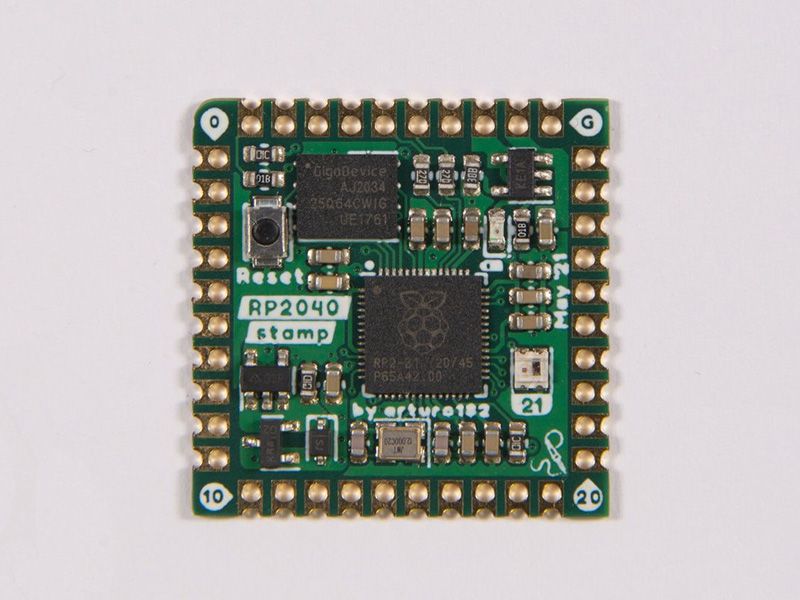
RP2040 Stamp by Solder Party
The Stamp was created to allow you to use the Raspberry Pi RP2040 in your designs without having to solder small-pitch QFN chips or worry about lots of external circuitry.
All you need to get you started is a 5V supply or a LiPo battery. The Stamp will take care of the charging and switching the power sources.
The castellated edges with 2mm pitch can be hand-soldered directly to a carrier board or by using pin headers. You can find footprints for many PCB programs here.
At only 1 by 1 inch, the Stamp packs a lot of features:
- 8MB of FLASH
- 500mA 3.3V LDO
- All 30 GPIOs broken out
- A Neopixel
- LiPo supply and charging circuit (with charging LED)
- USB broken out
- SWD broken out
- Reset Button
- 12MHz crystal
and of course, everything that comes with the Raspberry Pi RP2040 itself:
- Dual core ARM Cortex-M0+ @ 133MHz
- 264kB SRAM
- 2 UARTs
- 2 SPIs
- 2 I2Cs
- 16 PWM channels
- USB with Host and Device support
The RP2040 comes with a pre-programmed ROM UF2 Bootloader, by pulling the BOOTSEL pin low and resetting, or by double-pressing the RESET button (if the FW supports it), you can upload new firmware using the USB disk drive.
In addition to the Stamp, we also offer a reference design - the RP2040 Stamp Carrier.
The CircuitPython firmware for the Stamp comes with a built-in board file for the Carrier, you can access it using import stamp_carrier_board as board. After that, you can access all the Carrier pins and interfaces like you would with any other CPY board.
Links
Contribute
Have some info to add for this board? Edit the source for this page here.
CircuitPython 9.2.8
This is the latest stable release of CircuitPython that will work with the RP2040 Stamp. Use this release if you are new to CircuitPython.
Modules included in this download
_asyncio _bleio _eve _pixelmap adafruit_bus_device adafruit_pixelbuf aesio alarm analogbufio analogio array atexit audiobusio audiocore audiomixer audiomp3 audiopwmio binascii bitbangio bitmapfilter bitmaptools bitops board builtins builtins.pow3 busdisplay busio busio.SPI busio.UART codeop collections countio digitalio displayio epaperdisplay errno floppyio fontio fourwire framebufferio getpass gifio hashlib i2cdisplaybus i2ctarget imagecapture io jpegio json keypad keypad.KeyMatrix keypad.Keys keypad.ShiftRegisterKeys keypad_demux keypad_demux.DemuxKeyMatrix locale math memorymap microcontroller msgpack neopixel_write nvm onewireio os os.getenv paralleldisplaybus picodvi pulseio pwmio qrio rainbowio random re rgbmatrix rotaryio rp2pio rtc sdcardio select sharpdisplay storage struct supervisor synthio sys terminalio tilepalettemapper time touchio traceback ulab usb usb_cdc usb_hid usb_host usb_midi usb_video vectorio warnings watchdog zlibIncluded frozen(?) modules: adafruit_hid, adafruit_register, neopixel, stamp_carrier_board, stamp_carrier_board_xl, stamp_round_carrier_board
Features: Battery Charging, Castellated Pads
CircuitPython 10.0.0-beta.0
This is the latest development release of CircuitPython that will work with the RP2040 Stamp.
Alpha development releases are early releases. They are unfinished, are likely to have bugs, and the features they provide may change. Beta releases may have some bugs and unfinished features, but should be suitable for many uses. A Release Candidate (rc) release is considered done and will become the next stable release, assuming no further issues are found.
Please try alpha, beta, and rc releases if you are able. Your testing is invaluable: it helps us uncover and find issues quickly.
Release Notes for 10.0.0-beta.0
Modules included in this download
_asyncio _bleio _bleio (HCI co-processor) _eve _pixelmap adafruit_bus_device adafruit_pixelbuf aesio alarm analogbufio analogio array atexit audiobusio audiocore audiomixer audiomp3 audiopwmio binascii bitbangio bitmapfilter bitmaptools bitops board builtins builtins.pow3 busdisplay busio busio.SPI busio.UART codeop collections countio digitalio displayio epaperdisplay errno floppyio fontio fourwire framebufferio getpass gifio hashlib i2cdisplaybus i2ctarget imagecapture io jpegio json keypad keypad.KeyMatrix keypad.Keys keypad.ShiftRegisterKeys keypad_demux keypad_demux.DemuxKeyMatrix locale lvfontio math memorymap microcontroller msgpack neopixel_write nvm onewireio os os.getenv paralleldisplaybus picodvi pulseio pwmio qrio rainbowio random re rgbmatrix rotaryio rp2pio rtc sdcardio select sharpdisplay storage struct supervisor synthio sys terminalio tilepalettemapper time touchio traceback ulab usb usb_cdc usb_hid usb_host usb_midi usb_video vectorio warnings watchdog zlibIncluded frozen(?) modules: adafruit_hid, adafruit_register, neopixel, stamp_carrier_board, stamp_carrier_board_xl, stamp_round_carrier_board
Features: Battery Charging, Castellated Pads
Absolute Newest
Every time we commit new code to CircuitPython we automatically build binaries for each board and language. The binaries are stored on Amazon S3, organized by board, and then by language. These releases are even newer than the development release listed above. Try them if you want the absolute latest and are feeling daring or want to see if a problem has been fixed.
Previous Versions of CircuitPython
All previous releases of CircuitPython are available for download from Amazon S3 through the button below. For very old releases, look in the OLD/ folder for each board. Release notes for each release are available at GitHub button below.
Older releases are useful for testing if you something appears to be broken in a newer release but used to work, or if you have older code that depends on features only available in an older release. Otherwise we recommend using the latest stable release.
